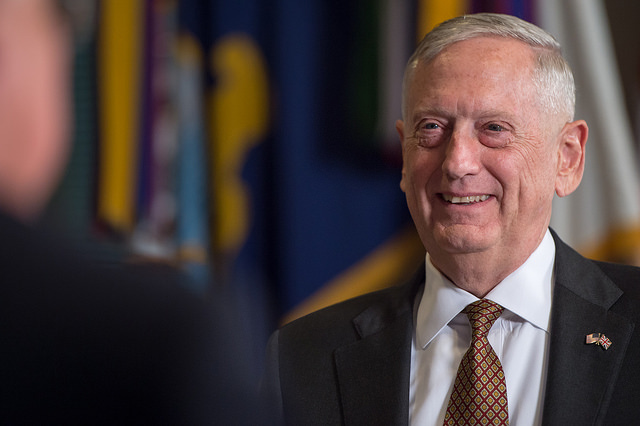In June, the Washington Post accidentally published a photo that clearly showed Defense Secretary James Mattis’ cell phone number, prompting the site to quickly pull the picture down… but not before Mercer Island High School student Teddy Fischer managed to save it.
The sophomore hoped he’d manage to get the legendary Marine on the line for an interview he could submit to his school paper – so he called it and left a message. To his surprise, he received a call back just a few days later: James Mattis had agreed to the interview.
“I’ve always tried to help students because I think we owe it to you young folks to pass on what we learned going down the road so that you can make your own mistakes, not the same ones we made,” Mattis said to Fischer and his school paper colleague, Jane Gormley.
The Secretary of Defense, and former college professor, proceeded to conduct a lengthy forty-five minute interview with the students, in which he reportedly treated the student journalists with the same regard, and respect, he provides professionals in the industry.
“Mattis surprised me because he was willing to treat our staff like adults by giving complete, coherent, thoughtful, and long responses to every question. Mattis said to me that he speaks to students the same way he would speak to congressmen, politicians, or generals, adding that he thought high-schoolers were ‘plenty bright,'” said Fischer.
During the interview, the SECDEF addressed global security concerns like ISIS, explaining that he believes the route to stopping Islamic Extremism involves more education than it does bombs.
“I wonder what would happen if we turned around and we helped pay for high school students, a boy and girl at each high school in that country to come to America for one year and don’t do it just once, but do it 10 years in a row. Every high school, whether it be in Afghanistan or Syria or wherever, would send one boy and one girl for one year to Mercer island or to Topeka, Kansas or wherever,” said Mattis.
“I think ideologies can be countered by showing people a better education and hope for the future by learning how to get along with one another,” added the man who is often called “Mad Dog.”
Mattis also spoke at length about his concerns domestically, particularly the highly partisan culture we’ve come to cultivate in national politics.
“I think the first thing is to be very slow to characterize your fellow Americans. I know that when people have to run for office they have to say ‘I’m smart and my opponent’s dumb,’ or ‘I’ve got better ideas than my opponent.’ That’s politics there’s nothing wrong with that. But, I get very, very concerned when I hear people start characterizing their opponents as stupid.” Mattis said.
“I still understand that because politics is a little rough and tumble at times, but I don’t buy it and when they start calling each other either crazy or evil. You and I, we don’t compromise with crazy people or evil people. And so, I don’t think that’s helpful. Generally speaking, just because someone disagrees with you doesn’t make them crazy or evil.”
Already have an account? Sign In
Two ways to continue to read this article.
Subscribe
$1.99
every 4 weeks
- Unlimited access to all articles
- Support independent journalism
- Ad-free reading experience
Subscribe Now
Recurring Monthly. Cancel Anytime.
Mattis went on to explain why he believes our culture has become so polarizing, and how best to combat it in ourselves.
“It’s like those people just want to stop thinking. They know what they think, they don’t read anything but one newspaper that agrees with them or they watch only one television news show because it reinforces them, instead of listening to the ones that don’t agree with them. So, I think the way you get over it is, you take people one at a time and you give them the same credit you give yourself and your ideas.”
The complete interview offers a number of insights into Mattis’ perspective on global conflict, and even the nature of war itself. You can read the transcript in its entirety here.
Image courtesy of the Department of Defense










COMMENTS